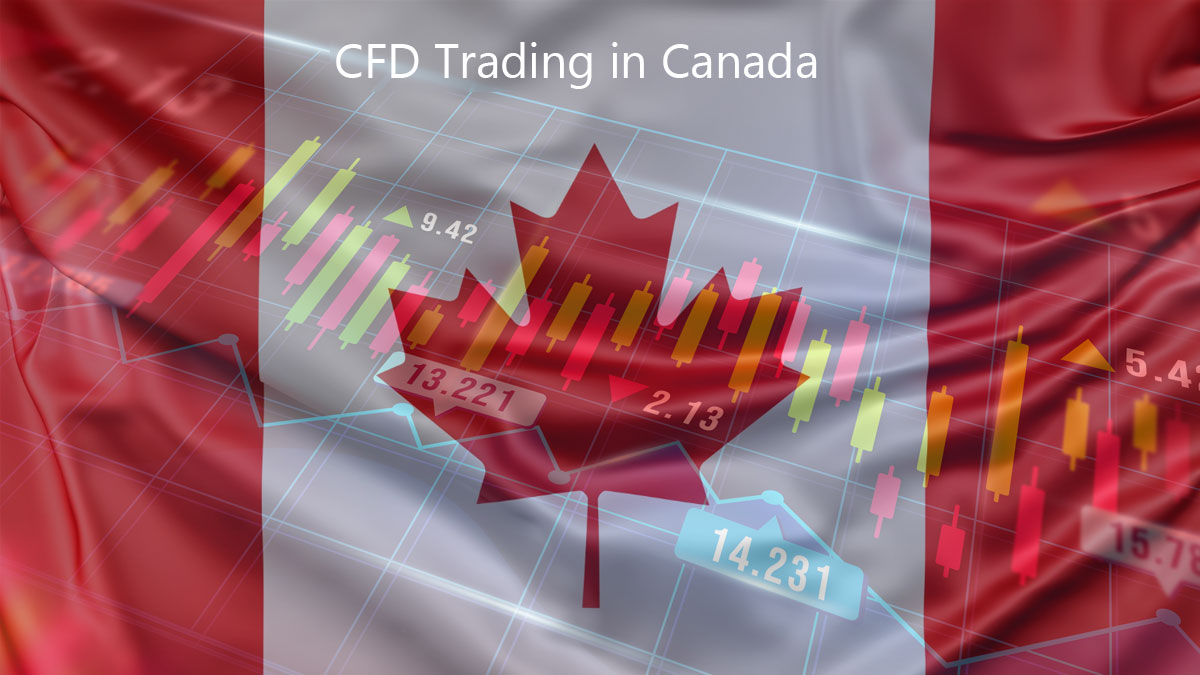- Education
- Trading CFDs
- CFD Trading in Canada
CFD Trading in Canada
CFD trading in Canada is entirely legal and exceptionally well-regulated. There are plenty of great broker options available to you and in this guide, we’re going to tell you everything you need to know about this popular investment opportunity.
In the article we will talk about regulation that applies to CFD trading in Canada. We will also cover CFD trading platforms; present you with competitive analyses between MetaTrader 4, MetaTrader 5 and NetTradeX.

KEY TAKEAWAYS
- CFD trading in Canada is entirely legal and exceptionally well-regulated.
- Even though Canadian CFD traders enjoy one of the most secure trading environments in the world, they also face some restrictions due to strict regulations, especially when it comes to leverage.
- Before traders can start trading CFDs in Canada they will have to verify a number of details.
What is CFD Trading
Contracts for Differences (CFDs) are agreements between buyers and sellers to pay for the difference between the current price of a security and the price at the time the contract is entered into. They are also derivatives, which means that you do not own the underlying asset.
CFDs are especially popular for two reasons:
- Traders can buy CFDs on stocks, forex, futures, options, commodities and many other markets online.
- Trading can be funded by depositing a small percentage of a trade, known as margin, and borrowing the rest from a brokerage firm. This increases potential profits, but also potential losses.
When trading intraday, a trader will probably not hold any CFD positions overnight. Instead, you are more likely to make a large number of CFD trades in a single day. To find trading opportunities, traders need to focus on liquid, volatile markets. For example, oil, bitcoin and forex CFD trading are popular options.
CFD Example
Let's look at an example of a CFD.
Let's say a trader has chosen a stock with a sell price of $35 and you open a CFD for 100 shares.
That is, if you buy shares in the traditional way, the cost will be $ 3,500, plus commissions or trading costs.
However, a CFD broker often requires as little as 5% margin. This will allow you to enter the same trade but for only $135. Which is attractive.
When a trader enters his CFD, the position will show a loss equal to the spread. This means that if the spread from the broker is 5 cents, the trader will need the stock to rise by at least 5 cents to break even. Here is Canadian stock list, if you want to try demo trading
CFD Trading Platforms
To make transactions with financial instruments, you can choose any of the popular terminals - NetTradeX, MT4 and MT5. MetaTrader 5 boasts state-of-the-art features, including the ability to hedge trades, while the classic version of MetaTrader 4 is slightly less advanced, but thus much more suitable for those who are just starting out in the financial markets. And last but not least NetTradeX, it is designed for CFD and Forex trading, and also offers unlimited instruments.
Then this feature comparison is for you!
| NetTradeX | MT4 | MT5 | |
|---|---|---|---|
| Trading on the chart | ❌ | ✔ | ✔ |
| Programming Languages | NTL+ | MQL4 | MQL5 |
| One-click trading | ✔ | ✔ | ✔ |
| Built-in technical indicators | +30 | +30 | +30 |
| Custom indicators | Unlimited | +7000 | +7000 |
| Execution Model> | STP | ECN | ECN |
| Advisor trading | ✔ | ✔ | ✔ |
| Linked order | ✔ | ✔ | ✔ |
| Pending order | ✔ | ✔ | ✔ |
| OCO orders (One cancels other) | ✔ | ❌ | ❌ |
| Activated orders | ✔ | ❌ | ✔ |
| Trailing Stop on server side | ✔ | ❌ | ❌ |
| Trading signals service | ❌ | ✔ | ✔ |
| Position or order accuracy | 0.01 (0.0000001 lot) | 1000 (0.01 lot) | 1000 (0.01 lot) |
| Locked positions | ✔ | ✔ | ✔ |
| Personal composite instruments | ✔ | ❌ | ❌ |
| Detailed trading & balance history | ✔ | ✔ | ✔ |
| Trading mode | ✔ | ❌ | ✔ |
| Displaying multiple instruments on the same chart | ✔ | ❌ | ❌ |
| Tech analysis tools | ✔ | ✔ | ✔ |
| Live news | ✔ | ✔ | ✔ |
When choosing a trading platform for CFD trading in Canada or any other country, traders should pay attention to the following features:
1.Commissions and fees
In order to trade CFDs and access the markets, you will have to pay a commission to the trading platform provider. You will be charged for every trade you place, and fees vary between providers. In addition, you may have to pay to access additional research data. Some platforms charge interest on overnight long CFD positions, so carefully review any fees that may be charged to your account.
2. Market data
What market and underlying asset performance data does the trading platform provide? Do I need to pay to access this data?
3. Research tools
Consider available research tools if you plan to research companies, stock prices, and overall market performance. These tools will help you make informed trading decisions.
4. Ease of use
Look for a platform that is simple and intuitive to use. Many platforms allow you to open a demo account to familiarize yourself with the services, and this can be very useful when making a final decision.
5. Trading methods
In addition to online trading through a computer, is it possible to open trades by phone or through an application on a tablet or other mobile device?
6. Margin requirements
In order to open a CFD, you will need to pay a margin - a certain percentage of the total value of the trade. Margin requirements vary from provider to provider.
7. Margin calls
If the trade you opened turned out to be unprofitable, and there are not enough funds in your account to cover the debt, the CFD provider sends a margin call. Some providers send alerts to notify you of a margin call opportunity, but others do not, and account control is entirely your responsibility.
Is CFD Trading In Canada Legal
CFD trading in Canada is legal, although heavily regulated.
Brokerage firms operating in Canada or opening accounts for Canadian citizens must comply with the rules set by the Investment Industry Regulatory Organization of Canada (IIROC).
At the local level, three other agencies oversee financial markets:
- Ontario Securities Commission
- Autorité des Marchés Financiers
- British Columbia Securities Commission
Before opening a trading account, check the IIROC risk disclosure at the bottom of the provider's website. In addition, IIROC's Dealers We Regulate page lists all regulated companies. Accounts with regulated Canadian firms will receive cash protection of up to CAD 1 million in the event of bankruptcy.
Before traders can start trading CFDs in Canada they will have to verify a number of details, such as:
- ID and address
- Age and occupation
- Social Security number
- Marital status and dependents
- Investment experience and knowledge
- Income and investment goals
- Source of account funds
- Risk tolerance
Over the past few years, IIROC and local regulators have been working towards regulatory harmonization. Unfortunately, inconsistencies still remain.
Bottom Line on CFD Trading in Canada
We hope we have been able to shed some light on CFD trading in Canada and the article has provided you with useful and valuable information. Whether you want to trade CFDs in Canada or are looking for the best CFD broker in Japan, many CFD trading principles are similar.
We urge you to limit yourself to trading only with CFD brokers that are properly licensed and regulated for the Canadian market.
To Summarize:
- CFD trading is completely legal in Canada, but is highly regulated. Market rules are set by the Investment Industry Regulatory Organization of Canada (IIROC), which is overseen by the Financial Institutions Supervisory Committee (FISC). Online brokers accepting clients from Canada must fully comply with the requirements set by the IIROC.
- Even though Canadian CFD traders enjoy one of the most secure trading environments in the world, they also face some restrictions due to strict regulations, especially when it comes to leverage.

